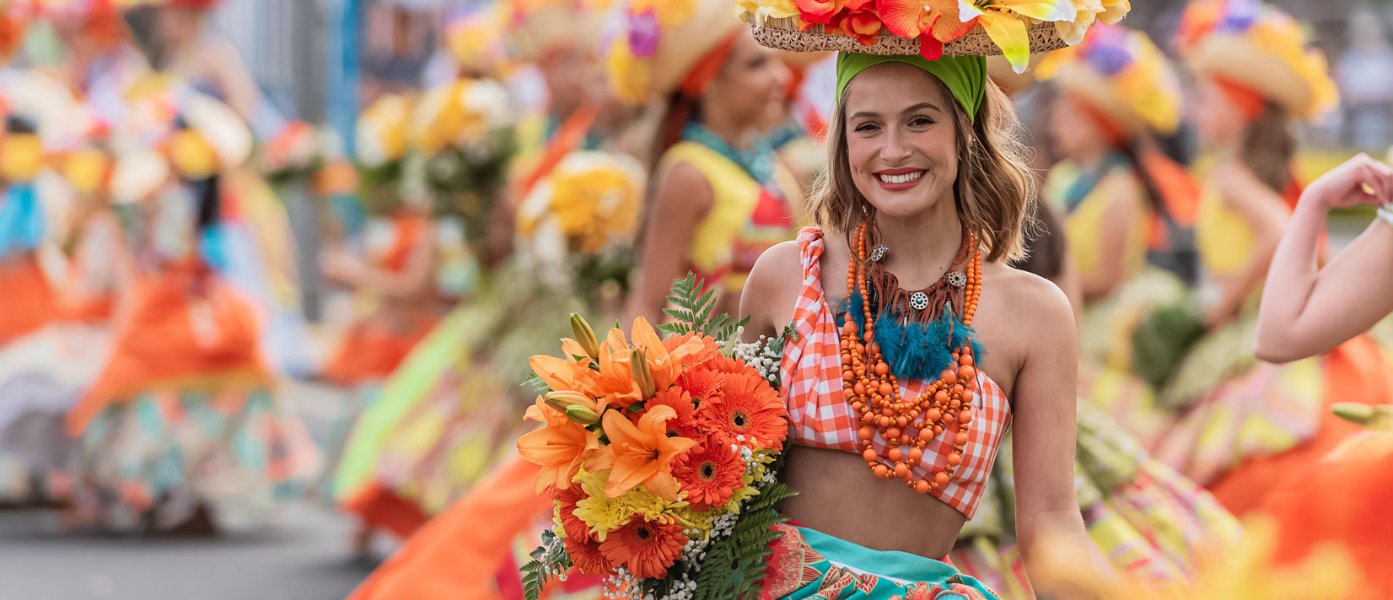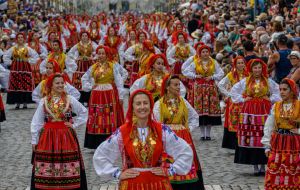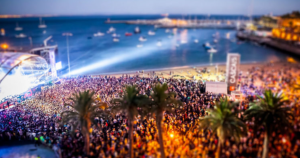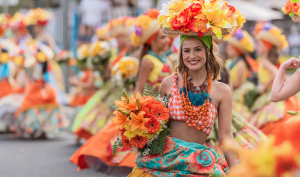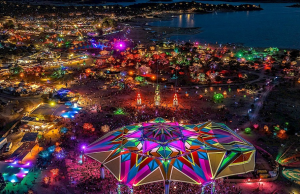Festivals and Traditional Festivities in Portugal: A Journey from North to South
Portugal is a land of rich cultural traditions and vibrant festivities that showcase the country’s deep-rooted customs and local pride. From the northern Minho region to the sun-soaked Algarve and the picturesque islands of Madeira and the Azores, each area offers unique celebrations. Here’s an in-depth look at some of the most iconic festivals and traditional festivities across Portugal, including coastal cities, interior towns, and everything in between.
Northern Portugal
Viana do Castelo: Festa de Nossa Senhora da Agonia
Image credits: CM Viana do Castelo
Held annually in August, the Festa de Nossa Senhora da Agonia in Viana do Castelo is one of Portugal’s most colorful festivals. Devoted to Our Lady of Sorrows, the event features traditional processions, folk dancing, and the stunning parade of mordomas, women dressed in elaborate traditional costumes adorned with intricate gold jewelry. The highlight is the procession to the sea, where the faithful seek the Virgin’s blessing for protection against ocean perils.
Porto: Festa de São João
Celebrated on June 23rd, the Festa de São João in Porto is one of the city’s most beloved festivities. This lively event honors Saint John the Baptist with street parties, concerts, and fireworks. A unique tradition during this festival is the playful act of hitting people on the head with soft plastic hammers or leeks, a custom believed to bring good luck.
Braga: Semana Santa
Braga’s Semana Santa (Holy Week) is one of Portugal’s most significant religious events, held during the week leading up to Easter. The city is known for its solemn processions, including the famous Procession of the Lord’s Burial. Participants dress in traditional garments, and the streets are adorned with intricate carpets of flowers, creating a deeply spiritual atmosphere.
Central Portugal
Coimbra: Queima das Fitas
In the historic city of Coimbra, home to one of Europe’s oldest universities, the Queima das Fitas is a significant academic tradition held in early May. This week-long celebration marks the end of the academic year and includes a grand parade, concerts, and various cultural events. Students wear colorful ribbons representing their faculties and burn their “fitas” (ribbons) as a symbolic farewell to their academic life.
Tomar: Festa dos Tabuleiros
Every four years in Tomar, the Festa dos Tabuleiros (Festival of the Trays) draws visitors from all over the country. This ancient festival, rooted in medieval traditions, takes place in July and honors the Holy Spirit. The highlight is the grand parade where young women carry trays adorned with bread and flowers on their heads, symbolizing abundance and blessing.
Óbidos: Festival Internacional de Chocolate
Óbidos, a charming medieval town, hosts the Festival Internacional de Chocolate in March and April. This event attracts chocolate lovers from around the world with its impressive chocolate sculptures, workshops, and tastings. The narrow cobblestone streets of Óbidos are filled with the aroma of chocolate, making it a delightful experience for visitors of all ages.
Lisbon and Surroundings
Lisbon: Santo António Festival
Lisbon’s Santo António Festival, held on June 12th-13th, is one of the city’s most cherished events. Saint Anthony, the patron saint of Lisbon, is celebrated with lively street parties, traditional music, and dance. The Alfama district, with its narrow, winding streets, becomes the epicenter of festivities, featuring grilled sardines, basil plants, and paper decorations.
Cascais: Festas do Mar
Image credits: NIT
The Festas do Mar (Festivals of the Sea) in Cascais is a vibrant celebration held every August. It pays homage to the town’s maritime heritage with a series of concerts, cultural performances, and maritime-themed activities. The festival culminates in a spectacular fireworks display over the Bay of Cascais. This event is a highlight of the summer season, attracting locals and tourists alike to enjoy the coastal beauty and lively atmosphere.
Sintra: Festa de São Pedro
In the picturesque town of Sintra, the Festa de São Pedro in late June celebrates Saint Peter, the patron saint of fishermen. The festival features processions, folk dances, and local gastronomy, reflecting the town’s rich maritime heritage. Traditional crafts and products are showcased, adding to the charm of this cultural event.
Alentejo Region
Évora: Feira de São João
Évora’s Feira de São João, held in June, is one of the oldest fairs in Portugal, dating back to the 16th century. This traditional event blends religious celebrations with a lively fair, featuring concerts, bullfights, and exhibitions. The highlight is the procession of Saint John through the historical streets of Évora, a UNESCO World Heritage site.
Monsaraz: Festa do Cante Alentejano
Monsaraz, a picturesque village in the Alentejo region, hosts the Festa do Cante Alentejano in October. This festival celebrates the unique polyphonic singing style known as Cante Alentejano, recognized by UNESCO as Intangible Cultural Heritage. The event includes performances by local choirs, traditional food, and wine tastings, offering a deep dive into the region’s cultural traditions.
Southern Portugal
Loulé: Carnaval de Loulé
Loulé in the Algarve region is famous for its vibrant Carnaval, one of the best-known in Portugal. Held in February or March, this carnival features elaborate parades with floats, samba dancers, and colorful costumes. It’s a time of joy and revelry, attracting thousands of visitors who come to experience the festive atmosphere and the region’s warm hospitality.
Faro: Festa da Ria Formosa
The Festa da Ria Formosa in Faro, held in August, celebrates the rich natural heritage of the Ria Formosa lagoon. This event features traditional boat races, seafood tastings, and cultural performances. The festival highlights the region’s maritime traditions and the importance of preserving its unique ecosystem.
Islands: Madeira and the Azores
Madeira: Festa da Flor
Image credits: Visit Madeira
Madeira’s Festa da Flor (Flower Festival) is a spectacular celebration of spring, taking place in Funchal in April. The festival is known for its stunning flower carpets, vibrant parades, and the Wall of Hope, where children place flowers symbolizing peace. It’s a visual feast that showcases the island’s floral diversity and natural beauty.
Azores: Festas do Senhor Santo Cristo dos Milagres
In the Azores, the Festas do Senhor Santo Cristo dos Milagres is one of the most important religious festivals, held on the fifth Sunday after Easter in Ponta Delgada, São Miguel. The festival honors the image of the Lord Holy Christ of the Miracles with solemn processions, religious ceremonies, and cultural activities. Pilgrims from all over the world come to participate in this deeply spiritual event.
Interior Regions
Trás-os-Montes: Festa dos Caretos
In Trás-os-Montes, particularly in the village of Podence, the Festa dos Caretos is a unique Carnival celebration held in February. Men dressed as “Caretos,” wearing colorful costumes and wooden masks, run through the streets, creating a mischievous and playful atmosphere. This ancient tradition, recognized as UNESCO Intangible Cultural Heritage, is a vibrant expression of local folklore.
Castelo Branco: Festa das Flores
The town of Campo Maior in the Castelo Branco district celebrates the Festa das Flores (Festival of Flowers) every four years in late August or early September. Residents decorate their streets with intricate paper flowers, creating stunning floral canopies. This community-driven event transforms the town into a colorful garden, attracting visitors from across the country.
Beira Baixa: Festa da Amendoeira em Flor
The Festa da Amendoeira em Flor (Almond Blossom Festival) in Beira Baixa, particularly in the village of Figueira de Castelo Rodrigo, is held in February and March. This festival celebrates the blooming of almond trees, which cover the landscape in a sea of white and pink flowers. The event includes cultural performances, traditional music, and local food, celebrating the beauty of nature and regional traditions.
Guarda: Feira Farta
The Feira Farta in Guarda, held in September, is a traditional fair that celebrates the agricultural and cultural richness of the region. The event features exhibitions of local produce, crafts, and livestock, as well as folk music and dance performances. It’s a celebration of rural life and a showcase of the region’s artisanal and gastronomic heritage.
Idanha-a-Nova: Boom Festival
Though not traditional in the classical sense, the Boom Festival in Idanha-a-Nova is an internationally renowned event that celebrates art, music, and sustainability. Held biennially in August, this alternative festival attracts a global audience with its psychedelic music, workshops, and ecological initiatives. It’s a unique blend of modern and traditional, set against the backdrop of Portugal’s interior landscapes.
Image credits: Boom Festival
Portugal’s festivals and traditional festivities are a vivid expression of the country’s cultural diversity and community spirit. From the lush north to the sunny south, the vibrant coastal areas to the serene interior regions, each festival offers a unique experience that highlights the traditions, beliefs, and creativity of the Portuguese people. Whether you are drawn to the lively street parties of the Santo António Festival in Lisbon, the solemn processions of Semana Santa in Braga, or the colorful floral displays of the Festa das Flores in Campo Maior, Portugal’s rich cultural calendar provides unforgettable experiences for everyone.

For tailor-made tours or other programs, please get in touch with us through the telephone below or by filling out the form.

